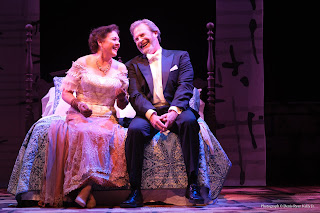Jazz Kitchen summer is crowned by much-anticipated return of the Steve Allee Big Band
 |
| Multiple views of Steve Allee addressing Saturday's audience |
It's always a treat, and there's always new material jostling with old favorites when the Steve Allee Big Band returns to the Jazz Kitchen.
The pianist-bandleader is forever writing, it seems, and when he speaks about "our new composition" it doesn't come across as "the royal we," but rather a way of emphasizing his sturdy zest for collaboration with excellent musicians. That was consistently evident in the band's second set Saturday night.
The 18-piece ensemble always rivals the cookin' going on in the club's actual kitchen: Mouth-watering, palate-pleasing, and both easy and stimulating to digest. That prevailed from the well-knit opener, "Doppelganger," which settled into a full-ensemble riff behind the solo partnership of the pianist and vibraphonist Rusty Burge, to the deceptively chaotic "Bus to Belmopan," one of the old favorites.
There were a few visits to the "funky thide of sings," to borrow a phrase from Billy Cobham. "Hey Hey" provided a well-tuned vehicle for Mike Stricklin. Known for his local representation of the "Texas tenor" style, in this band he plays alto sax. I don't know if there's such a mode as "Texas alto," though that could be applied to the late, unique Ornette Coleman (checkpoint: "Ramblin'"). But Stricklin is from a different kettle of fish, and he cooked up well here (with an ascent to a high-register squeal in his first phrase, a Texas alto indeed) and later in a solo spotlight shared with tenorman Rob Dixon on "Twisted Taffy."
That song also exhibited the band's precision, with short, pinpoint phrases well-linked over brief pauses. Throughout the set, the aggregation always swung regardless of any of the arrangements' intricacy, thanks to the superior drumming mastery of Steve Houghton.
On "Brothers," the rich sound of the reeds was remarkable — the sax section sometimes recalling the phrase Virgil Thomson once applied to the Philadelphia Orchestra's strings: "as if the suavity of it were a visual and a tactile thing, like pale pinky-brown velvet."
On the other hand, while Allee doesn't often move toward the grandiose in his ensemble writing, he can call upon a coordinated adrenaline rush from such an outstanding set of musicians. You don't always need nuance: I loved the way the ensemble built toward a climax in "Brothers," somewhat bringing to mind the great "New Testament" sound of the 1950s Count Basie band.
The integrity of the ensemble held up especially well in "Freedom," a sort of suite that moved into several territories. Instrumentation shifted subtly, with saxes replaced by a couple of clarinets and a flute, shifting the timbre. There was a wonderful episode of call-and-response with Jeff Conrad's high trumpet answering Dixon's tenor. The piece lived up to its title. But Allee-esque freedom dependably has a kind of firm, gentle control applied to it, and such is among the joys of listening live to his Big Band.
[Photos by Rob Ambrose]



Comments
Post a Comment